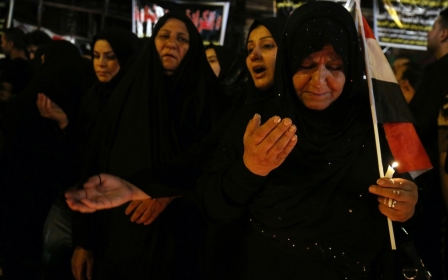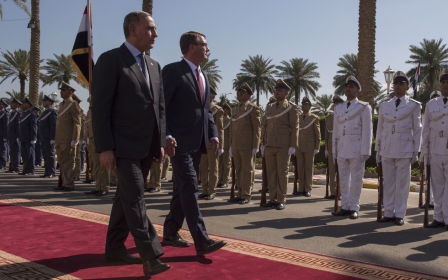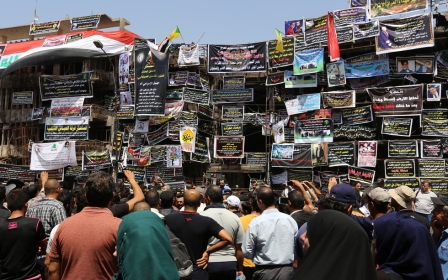REVEALED: Baghdad bomb detectors left unused as ministers squabbled
BAGHDAD - Dozens of advanced bomb-detecting vehicles remained unused during 16 months of vicious Islamic State (IS) group attacks in Baghdad amid political power games, ministerial rivalries and poor bureaucratic oversight, government sources told Middle East Eye.
Iraqi officials and members of the parliamentary security and defence committee told MEE that the interior ministry had bought 40 M60 Rapiscan Mobile Eagle scanning vehicles and 54 smaller VACIS M6500 inspection systems three years ago.
Both use X-rays to detect suspicious objects within vehicles and are several steps up from handheld detectors in service with Iraqi security forces.
But they remain parked in interior ministry warehouses despite a murderous campaign by IS that has killed thousands of civilians, including 323 in an attack in the Shia area of Karrada on 3 July - by far the biggest of its kind since the US-led invasion of 2003.
Twelve Rapiscans have since been deployed to the six entrances into Baghdad, but all others remain in storage.
"These vehicles are very advanced. The plan was to deploy the big vehicles at the entrances of the city and use the smaller ones in patrols in the street," said Adnan al-Assadi, a prominent member of the parliamentary committee and a former deputy interior minister involved in negotiations to buy the vehicles.
"Using this kind of inspection systems would confuse the terrorists - they are mobile and move from one street to another, and could reduce the damage by 90 percent."
Shikhwan Abdulla, another member of the committee, said: "We have about 100 vehicles. They are desperately needed. Our problem is neglect and weak technical and administrative systems."
But other sources within the security apparatus and other MPs from the parliamentary committee said the vehicles were mothballed because of rivalries between Prime Minister Haider al-Abadi and his former interior minister, Mohammed al-Ghabban, who resigned on the day of the Karrada attack.
Two days later, Abadi ordered the Rapiscan vehicles deployed in Baghdad and opened an investigation into why they had sat idle for a year. An investigation has also been launched by the parliamentary committee.
The sources said that Ghabban had refused to release the vehicles until he took full control of Baghdad security from the "joint military operations command" - thereby ensuring it was he alone who would be credited with any success in the capital.
"If these vehicles would be deployed in Baghdad and achieve success, people would credit this to the commander of Baghdad's security operation centre supervised by Abadi, and not Ghabban," said a senior security official close to Abadi, who spoke anonymously.
"Ghabban had been asking for full authority over the security of Baghdad for a year. He was looking to get that success," the official said.
A member of the parliamentary committee, who also spoke anonymously, said allowing Ghabban complete control of security would "free the hands" of the Badr organisation, with which he is aligned, "to do what they want in Baghdad".
Badr is one of the most powerful Iran-backed Shia militias in Iraq, and is seen by many as deeply involved in the sectarian war of 2006-08.
Those squabbles and power plays have apparently left the capital poorly protected from bombing attacks.
Iraq's security forces have relied on two British-made detectors since 2007: the AED 650 and the AED 651, bought for tens of millions of dollars as the capital faced a suicide bombing campaign by the forerunner to IS, known as al-Qaeda in Iraq, which killed tens of thousands of people.
The government admitted in 2011 that both were completely ineffective and Jihad al-Jabiri, the commander of the anti-explosives squad, was sentenced to seven years in prison the same year for corruption surrounding their purchase.
However, the AED 651 remained in service until last month, when Abadi withdrew it and ordered the re-opening of all investigations into the contracts as part of a renewed anti-corruption campaign.
The Rapiscan vehicles were bought through the US Foreign Military Sales scheme, while the VACIS systems were bought directly by the interior ministry.
They cost a total of $190m - contracts were signed towards the end of Nouri al-Maliki's time as prime minister, and the vehicles were delivered after Haider al-Abadi took office in September 2014.
Ex-minister denies claims
Ghabban, however, rejected claims he had refused to release the vehicles, saying that the Rapiscan systems had "17 technical problems" that prevented their deployment during his time as interior minister.
"These are not explosives detectors. They are X-ray systems to inspect cargo and they totally depend on the experience of the operator. So do not say they are explosives detectors," Ghabban told MEE.
"The 17 technical problems which I was talking about were not relating to the manufacturing or the quality of these vehicles. They relate to the operational requirements," Ghabban said.
He added that 18 of the 54 VACIS systems were undelivered and all were still technically owned by the supplier and could not be rolled out, despite being in possession of the interior ministry.
Ghabban complained that Baghdad's security was a "mess" due to interventions by the various state bodies involved in the "joint military operations command," including interior, defence and the general chief of staff of the armed forces.
He denied any political motivations behind his refusal to deploy the systems.
"This issue is far away from politics and has nothing to do with the political rivalry or rivalry among positions. The delay of deployment was purely technical and professional," Ghabban told MEE.
"But it was exploited by some people inside the security and defence parliamentary committee".
This article is available in French on Middle East Eye French edition.
Middle East Eye propose une couverture et une analyse indépendantes et incomparables du Moyen-Orient, de l’Afrique du Nord et d’autres régions du monde. Pour en savoir plus sur la reprise de ce contenu et les frais qui s’appliquent, veuillez remplir ce formulaire [en anglais]. Pour en savoir plus sur MEE, cliquez ici [en anglais].





